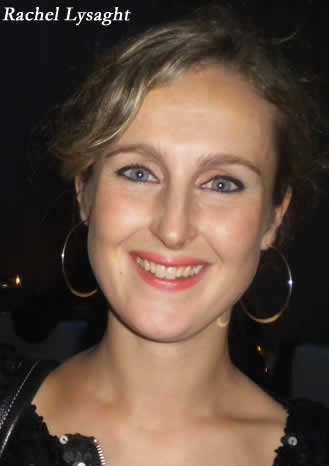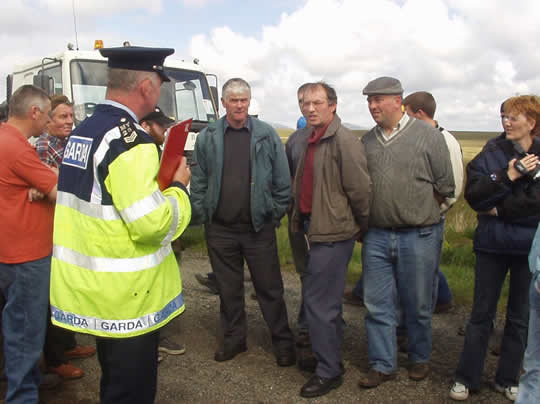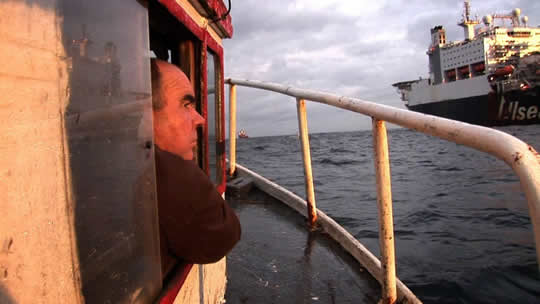 The perfect picture postcard village of Rossport nestles behind the dunes of a remote corner of west Ireland, but this peaceful tranquility belies the turmoil that lies beneath. The unique nature of its coastline, which has sustained generations of farmers and fishermen, has also delivered to Shell Oil the perfect landfall for the Corrib Gas Pipeline and building of nearby refinery.
The perfect picture postcard village of Rossport nestles behind the dunes of a remote corner of west Ireland, but this peaceful tranquility belies the turmoil that lies beneath. The unique nature of its coastline, which has sustained generations of farmers and fishermen, has also delivered to Shell Oil the perfect landfall for the Corrib Gas Pipeline and building of nearby refinery.
In the most dramatic clash of cultures in modern Ireland, the rights of farmers over their fields, and of fishermen to their fishing grounds, has come in direct conflict with one of the world’s most powerful oil companies. When the citizens look to their state for protection, they find that the state has put Shell’s right to lay a pipeline ahead of their own rights, and instead of protection, some are imprisoned.
The Pipe is a thrilling story of a community that becomes tragically divided, and how it deals with the threat of irreversible destruction and danger.
Rachel Lysaght is an award winning documentary and fiction drama film producer. A graduate of the Samuel Beckett School of Drama in Trinity College, Dublin, she is also a graduate of the European EAVE and Docu Regio programmes.
Rachel’s productions have won the Irish Council for Civil Liberties Human Rights Film Award , Best Documentary Film, GAZE Film Festival, Ireland, Irish Film & Television Award, Best First Irish Short, Galway Film Fleadh, Gradam Gael Linn, Cork Film Festival, Best Actress, Festival de Bruxelles and audience awards at Sapporo International Film Festival, Japan, Festival de Lyon-Villeurbanne, France and Santiago de Compostela Festival, Spain.
Rachel O’Meara: That was such an emotive and revealing film, how did you come to produce it?
Rachel Lysaght: Serendipity! I’ve always been interested in true stories – real life can be so much stranger than fiction, and in a lot of cases, can be even more powerful from the feeling of immediacy. I’d previously produced a documentary feature, Identities, which had won a Humanitarian Award from The Irish Council of Civil Liberties, and done well on the film festival circuit. Risteard O’Dohmnaill, the director of The Pipe, had been filming for three years, with 300 hours of filming already in the can, and he was looking for a producer to help bring the project to a conclusion and package the final production. The Irish Film Board have been very supportive of my work, and they kindly referred me to Risteard. 
We talked on the phone at length, and he sent me three hours of roughly assembled material. The day it arrived, I got home at 10pm and thought I’d initially scan through to get a feel of the material before I went to bed. But I couldn’t stop. I watched all three hours, by the end of which I’d worked myself up in to an absolute rage. This had been going on just five hours’ drive across the country from where I was living, and I felt angry with myself somehow, for not making myself sufficiently aware of it, and that it hadn’t been properly reported.
RO: How much did you now?
RL: I knew there had been protests going on down there, I knew about ‘The Rossport Five’, who were the first members of the local community jailed in 2005, for three months, for interfering with work being done on their land by Shell. But although it had been a big news story, the way the community had been portrayed was more that they were either anti-progress or eco warriors. And the news story had fizzled out over the years. But when I watched them, heard their views and saw their efforts, it was clear that these were just ordinary people, like your mum or uncle, with courage and dignity, and I thought it was an absolute travesty that people weren’t properly aware of the moral wrongness that was happening. During these seven years, nine people from the community have served jail time – three farmers, three fishermen and three school teachers – so something’s got to be wrong!
RO: The characters whose stories the film follows are very powerful, and gauging from the audience questions at the Q+A with you after the screening, they really caught people’s imaginations.
RL: Very much so. In the end we had over 400 hours of footage, and Risteard had been considering a political story, about the laws and legislation that could possibly have allowed this to happen in the first instance. But it felt a little dry when we had this other footage of emotional exchanges between local people and their police. Also when watching someone on the sea, or on the land, interacting with their environment, you can see from how they behave just how much it means to them. So we decided that the  human story. For people to see the intelligence and integrity that people behaved with under such sustained pressure, but also, the fight within the community –seeking a democratic approach wasn’t a bed of roses. It’s often people on the same side that have difficulty –wanting the same thing but wanting to go about things very differently – it can get fractious. It’s a warts and all story – not glamourizing or showing only the noble side. When you’re under pressure for so many years, of course there are going to be fights – relationships breakdown, then there’s healing again.
human story. For people to see the intelligence and integrity that people behaved with under such sustained pressure, but also, the fight within the community –seeking a democratic approach wasn’t a bed of roses. It’s often people on the same side that have difficulty –wanting the same thing but wanting to go about things very differently – it can get fractious. It’s a warts and all story – not glamourizing or showing only the noble side. When you’re under pressure for so many years, of course there are going to be fights – relationships breakdown, then there’s healing again.
I think that so much of the intimate footage that Risteard captured is incredible. Like when fisherman Pat O’Donnell is out at sea on his boat, and he’s being taken back to port by the police, whom he’s known for years, and he walks to the end of the boat, takes down his Tricolor [Irish flag], brings it in to the cabin and simply says to officers, “Shame on you, lads!”….. I mean, you couldn’t script that moment.
RO: The film is also extraordinary by way of its organic David-Goliath visual elements, with this small seaside community coming up against the police force by land, sea and air, then the Navy and gargantuan pipe laying ships. All with the back drop of the beautiful Irish landscape and music score.
RL: Yes, it’s visually very dramatic, and 99 per cent of the cinematography was shot by Ritchie. The post production took eight months, honing the story from 400 hours of footage to an 83 mints film, with Stephen O’Connell and Nigel O’Regan editing, and the music was an original score by Stephen Rennicks
RO: The film explores the significant conservation, ecological and disruption to the community issues, though it doesn’t discuss whether there would be a loss of opportunity for the Irish people – what’s your view on that?
RL: The gas field and refinery were being positioned as a great boost for the Irish people, that would bring Ireland jobs, finance, and its own source of energy. But in fact, unlike a similar venture in Norway, where the taxes levied are 75% which directly benefit the country, there would be no Royalties at all for the Irish people on the fuel extracted, and the corporation tax for Shell would only be 25%, who in turn are under no obligation to sell the oil and gas they produce to Ireland. Somehow, the elected Irish Government was giving more importance to the interests of big business over Ireland and its people.
RO: Congratulations of the raft of awards The Pipe has been winning!
RL: Thank you! Risteard isn’t here at the LA Irish Film Festival because he’s at the Reykjavik International Film Festival, Iceland, and he called me last night to say The Pipe won the Environmental Film Award, so it’s a good weekend!
For international screening details and to watch the trailer for The Pipe please visit the official website http://www.thepipethefilm.com/


